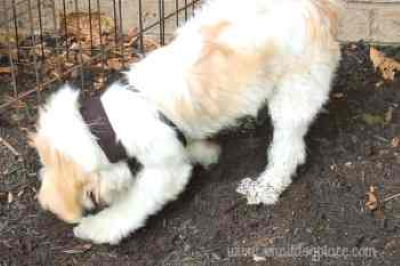- Home
- Problem Behaviors
Solving Bad Dog Behaviors
Solving Bad Dog Behaviors by Janice Jones M.A.
|Last Updated 03-05-2024
There are good dog behaviors and there are those that annoy, frustrate or exasperate us. Most people who have been around dogs for a period of time can identify some familiar behavioral problems. Some are more serious than others.
Some problems can be traced back to a genetics and normal canine behavior gone astray. Others are caused by the environment, either through poor socialization as a puppy, trauma, or simply through owners who have unwittingly encouraged behaviors that eventually become problems.
Unless pet owners have been trained, the average dog owner may recognize the problem but have little idea where the problem originated or how they can help their dog overcome or even eliminate the problem. If you are one of those owners, relax, you are not alone. Most people misunderstand and mishandle their dog’s behaviors.
There are 10 common dog behaviors that most people will experience with their dogs at one point in their life:
Common Dog Behaviors
Stubborn Behavior
Are you living with a Stubborn Shih Tzu? If so, you’re not alone. Many people tell me that this stubborn attitude in their beloved Shih Tzu is one of the hardest behaviors to live with, let alone train around. So, why do Shih Tzu dogs tend to be so stubborn?
Do you think of your dog as willful? Obstinate? Headstrong?
These are all words that mean the same as stubborn and are used to describe human behavior. But can dogs act in these ways?
More on Stubborn Shih Tzu
Barking
Almost all dogs bark, howl and whine to some extent. Toy and small breed dogs are more yappy than larger breeds. Shih Tzu dogs are one of the less yappy dogs, but there are always exceptions.
Excessive barking or nuisance barking is considered a behavior problem because it is disruptive and annoying. Before you can correct the barking, one must decide why the dog is vocalizing in the first place. These are the most common types of barking:
- Warning or To Alert
- Playfulness/Excitement
- Attention-seeking
- Anxiety
- Boredom
- Responding to Other Dogs
There are ways to curb excessive barking. When Shih Tzu barking becomes a problem, there’s not always a quick fix. It can be unnerving and stressful even to the calmest Shih Tzu owner. If you are like me, we understand that barking is the language of dogs. But when the barking becomes excessive, inappropriate, or poorly timed, it can try our patience.
Learn more about Shih Tzu Barking Problems.
Sometimes Shih Tzu Dogs Howl. Some might consider it cute, but if neighbors start to complain, dog howling can be anything but cute.
More on Shih Tzu Howling
Chewing
Chewing is a natural action for all dogs - it's just a part of the way they are wired. However, chewing can quickly become a behavior problem if the dog chews on objects not meant to be chewed, shoes, furniture, electrical wires and so forth. Again, there are commonly recognized reasons why dogs chew. The most common reasons dogs chew are as follows:
- Puppy Teething
- Boredom / Excess Energy
- Anxiety
- Curiosity (especially puppies)
You will never be able to eliminate all chewing in dogs, and of course you would not want to do so. But you can encourage appropriate chewing by providing plenty of toys and chews to keep your dog busy.
For items that you do not want chewed, you can either remove them (Puppy Proofing Your Home) or spray with a product such as Bitter Apple that leaves a nasty taste in their mouth.
Puppy Mouthing
It might seem cute when an eight week old puppy tries to use your hand as a chew toy, and if you are an adult, it probably is not painful. However, when the puppy gets to be eight months old, it is an entirely different story. There are ways to stop this behavior before it gets to be a major problem
Read more about Puppy Mouthing
Digging
If given the chance, most dogs will do some amount of digging, it is part of their instinct. Certain breeds, like Terriers, are more prone to digging because of their hunting histories. In many cases, we have bred certain dogs to dig.
Dogs such as Yorkshire Terriers were bred for one purpose: to dig out rats and other small rodents. But some Shih Tzu dogs will also try to dig if given the opportunity, especially puppies. In general, most dogs dig for these reasons:
- Boredom or Excess Energy
- Anxiety or Fear
- Hunting/ Prey Instinct
- Comfort-Seeking (such as nesting or cooling off)
- Hiding Possessions (like bones or toys)
- To Escape or Gain Access
- Curiosity (Puppies)
A dog that digs holes in the back yard can be frustrating. A dog that digs their way under a fence to escape can create a very dangerous situation. There are ways to eliminate this dog behavior.
Separation Anxiety
Separation anxiety is one of the most commonly discussed dog behavior problems. Shih Tzu and other small breed dogs are prone to separation anxiety because they were bred for one thing: to be a companion. When their human is not available, they cannot do the job they were meant to do.
This disorder manifests itself in excessive vocalization, chewing, inappropriate urination and defecation, and other forms of destruction that occur when a dog is separated from his owner. Not all of these actions are the result of separation anxiety. Signs of true separation anxiety include:
- Dog becomes anxious when owner prepares to leave
- Misbehavior occurs in the first 15-45 minutes after owner leaves the house
- Dog wants to follow owner around constantly
- Dog tries to be touching owner whenever possible
True separation anxiety requires dedicated training, behavior modification and desensitization exercises. Medication may be recommended in extreme cases, but this should be a last resort.
Inappropriate Urination
Inappropriate urination and defecation are among the most frustrating dog behaviors for their human families. They can damage areas of your home and make your dog unwelcome in public places or at the homes of others. It is most important that you discuss this behavior with your veterinarian first to rule out health problems. If no medical cause is found, try to determine the reason for the behavior, which can come down to one of the following
- Submissive/Excitement Urination
- Territorial Marking
- Anxiety
- Attention-seeking
- Lack of proper housebreaking
Inappropriate elimination is unavoidable in puppies, especially before 12 weeks of age. Older dogs are another story - many require serious behavior modification to rid them of the habit. Sometimes male (or female) marking in the home can be controlled if the dog is neutered or spayed. Sometimes diapers (for females) or belly bands (for males) will protect your home and possessions.
Coprophagia: Dogs Who Eat Poop
Another common problem associated with elimination is coprophagia, or the eating of feces. This is a common problem but thoroughly revolting to human. Starting in puppy-hood it can become a habit that is difficult to break.
Begging
Begging is a bad habit, but many dog owners unfortunately encourage it. This can lead to digestive problems and obesity. Worse yet, it can undermine your role as Alpha or the pack leader. The best way to avoid this annoying habit is never to encourage it in the first place.
Chasing
A dog's desire to chase moving things is simply a display of predatory instinct. Many dogs will chase other animals, people and cars. All of these can lead to dangerous and devastating outcomes! The Shih Tzu dog was never bred to have a predatory instinct so chasing is not usually a problem. Shih Tzu dogs do enjoy a rigorous game of tag with another Shih Tzu and this is usually a harmless behavior unless the chase is close to a busy road, then it can become one of those serious dog behaviors.
While you may not be able to stop your dog from trying to chase, you can take steps to prevent disaster. There are ways to prevent this behavior.
Jumping
Puppies jump up to reach and greet their mothers. Later, they may jump up when greeting people. Dogs may also jump up to exert dominance. A jumping dog can be annoying and even dangerous if it is a large breed dog. Some small breed dog owners do not consider jumping to be one of the ten top dog behaviors.
Most little dogs jump because their owners allow it to happen. There is little danger to an adult if a 6 pound dog jumps up. If jumping up on you is not your idea of fun even with a little dog, there are many methods to stop a dog's jumping, but not all will be successful. Lifting a knee, grabbing the paws, or pushing the dog away might work for some, but for most dogs this sends the wrong message. These methods are often considered Old School and newer ways seem to work better. There are ways to train your dog not to jump on people.
Biting
Dogs bite for reasons that can be traced back to instinct and pack mentality. Puppies bite and nip on other dogs and people as a means for exploring their environment and learning their place in the pack. Much of the biting behavior in puppies is due to teething. Owners must show their puppies that mouthing and biting are not acceptable by teaching bite inhibition. Beyond puppy behavior, the motivation to bite or snap typically comes from the following:
- Fear or Defensiveness
- Protection of Property
- Pain or Sickness
- Dominance Assertion
- Predatory Instinct
Some breeds bite more than others, but biting is one of the very serious dog behaviors. It can be control through proper training. Puppies bite when they are teething. Puppies learn bite inhibition from their mother and litter mates, but sometimes they need help from a human to overcome this habit.
More on Puppy Biting
Aggression
Dog aggression is one of those dog behaviors that often lead people to relinquish their dog to the local pound. It is displayed by growling, snarling, showing teeth, lunging and biting. All dogs have the potential to become aggressive, irrespective of breed or history.
However, dogs with violent or abusive histories and those bred from dogs with aggressive tendencies are much more likely to exhibit aggressive behavior towards people or other dogs. Reasons for aggression are basically the same as the reasons a dog will bite or snap, but overall canine aggression is a much more serious problem, one which can be dangerous to humans as well as the dog. There are some who consider small dogs to be more aggressive than larger dogs. Do you agree?
Depression
Depression is not really a behavioral problem, rather it can be a mental health crisis. How can you tell when your dog is depressed? They can't talk, so they can't tell you how they are feeling. We must look at outward appearances and behavior to decide whether our dogs are sad, depressed or ill. Some dogs develop a depressive episode after undergoing surgery. Find out if your dog may be suffering from depression.
The Link Between Diet and Behavior
Shih Tzus are small dogs, but anyone who owns one knows of their big personality. These charming, affectionate little dogs often carry the strength of character and energy levels of much larger breeds. However, did you know that their behavior, mood, and overall demeanor are directly influenced by what they eat?
How Diet Influences Your Shih Tzu's Behavior
"Hi, I'm Janice Jones, a former veterinary technician and Shih Tzu expert with over 40 years of experience with the breed. Through Miracle Shih Tzu, I combine my medical background and extensive breed knowledge to provide reliable, practical advice for Shih Tzu owners. My mission is to help you give your Shih Tzu the happiest, healthiest life possible through evidence-based information and real-world solutions. Whether you're new to the breed or a seasoned owner, you'll find trusted guidance here for all aspects of Shih Tzu care.
I hold an undergraduate degree in Psychology with a minor in biology, Early Childhood Education, and Nursing, and a Master's in Mental Health Counseling.






